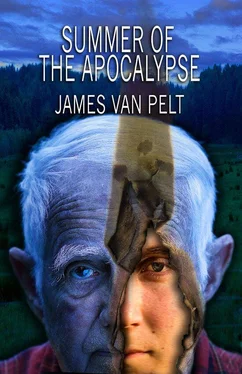“No,” Leda said. “You’re sopping wet.”
He felt her hands against his chest, holding him upright. Then she fumbled with the buttons. He could barely stand, the shivering was so hard, and he couldn’t tell what she was doing anymore. He was cold though. He knew that. Damn cold.
The room tilted. He tried to keep balance, but it was inevitable and irresistible, the bed rising up from the floor. I am, he thought, delirious, and that felt good, to let go, to let his guard drop. He could feel himself losing it.
And in his mind’s eye, fire haloed a two-story cedar house, a ring of light around a circle of dark. He could feel his dad’s hand on his shoulder. “Some things can’t be looked at straight on,” he said. Leda spoke from the darkness, her voice kind and low and subtle, full of breath. “Fifteen? You’re fifteen?” Then, from out of the eclipse, rose her face, and she smiled.
Chapter Seventeen
FIRST TIME
There are so many of them,” Eric said as another pair of soldiers marched by their hiding place, a pile of wood and brick rubble, the sunken remains of a house next to an intersection. A bent street sign leaning over the cracked sidewalk said “College Ave.” The other sign said “Broadway.” He had an awful premonition of hundreds of men like the ones who had executed the prisoners in the canyon the day before, a whole army overrunning Highwater and Littleton. There’d be no way to hold them back.
“No,” whispered Teach. “I think this is all of them, but they’re surrounding the campus, so it seems like a lot.” The patrol turned onto a path cut through head-high sage that grew between the distinctive red-stoned architecture of the University of Colorado. The building to the right of the path looked like a shell, its doors gone, the glassless windows gaping darkly. The smaller building on the left looked better cared for. Its windows were boarded, and the doors were barred tight. A thinning of the bushes showed where the sidewalk led to the door. In town, the streets were relatively clear of vegetation, the normal grasses pushing through cracks, but sage and greasewood crowded what used to be suburban lawns. On the campus, the growth seemed even wilder. Tough, dark-barked branches pushed against the buildings, choking the spaces between them. Most city trees, of course, thought Eric, died long ago. Boulder, like Denver, had once been covered by beautiful trees, all gone now without constant watering. A thin, mechanical sound drifted to him from somewhere deeper in the campus. It was speech, but high and tinny and he couldn’t make out the words. Someone on a bullhorn, he decided. Eric peered over the top of the rubble. From here, the red brick of the C.U. campus stood out from the dusty green and gray brush. He’d seen little evidence of fire damage in Boulder, which surprised him. Fires swept through the prairies around Littleton every five or six years, and none of the thousands of wood frame houses still stood. Only the most solid of the brick homes and the steel and glass businesses remained relatively unscathed. But here, the city’s empty buildings rattled and clattered and creaked in the breeze, and downed power lines flapped against their lonesome poles. Boulder was a true ghost town. All the damage seemed to be caused by vandalism, wind, rain or the plain old weight of time. “You know what makes me feel better,” Eric said, “is that I haven’t seen anything motorized. They may have guns, but no trucks or tanks.”
Teach grunted. “We’re on foot too, you know.” He scanned the buildings across the street sourly. “The problem is all this brush. It’s so thick. I don’t see but one or two ways through, and if Federal’s got any sense at all, they’re guarded. How are we going to get to your library? And for that matter, the campus is so big. How are we going to find the kids?”
Eric swallowed his fear. Since they’d reached the Boulder city limits, it had been all he could do to resist calling out for Dodge and Rabbit. They were out there somewhere, among the deserted houses, stupidly moving toward whatever goal he’d planted in their brains. “We ought to wait a bit…” said Eric, “…to see their routine. If we can get into any of those,” He waved at the structures across Broadway. “We might be able to make the library. Besides, the best we can do to meet up with the kids is to go to the place they know we’re going to. Either they’re there already, or they will be soon.”
“Okay,” said Teach. “We wait. You watch.” He propped the water skin beneath his head, shut his eyes, and within seconds, seemed to sleep.
Eric crawled a few feet away from Teach to a low spot in the foundation they hid behind. He could see both stretches of the street and the paths between the closest buildings. Rabbit, he thought, Dodge, where are you? He imagined them held captive or shot outright. How could he live knowing he’d brought them to this danger? He should have sent them home when they joined him days ago. Nothing was gained by bringing them. He stared at the backs of his liver-spotted hands, turned them over, made fists of them, and the bony knuckles stood out from the near translucent skin. I’m an old man, he thought. I needed them to be young for me, and, he admitted, closing his eyes, I wanted to be a better grandfather to Dodge than I was a father to Troy. If Dodge could see the books, he’d know. If he could see all the learning man has piled up, he’d know what man is capable of. We don’t have to fall back to the beginning. We can rise again, but we have to do it with him and his generation. Another handful of years, and it will all be too late. The secret is in the books. We find out what is making Littleton sick, then we go on and rebuild. That’s what we’ll do.
He could see in his imagination an older Dodge leading them bravely into the new world. No mistakes this time. It’d be a smarter, happier people who learned from the missteps of the past. But first we’ll have to find them.
The tramp of feet caught his ear, and he slid back a foot, pushing his chin into the dirt. Two more soldiers passed by, turning onto the same path the first two had followed. Ten minutes apart, or so, he thought. Eric jostled Teach. “Now’s the time,” he said.
Instantly alert, Teach rolled to his hands and knees, checked the street himself and nodded. “What’s the plan?”
“We start there.” Eric pointed to the damaged building.
In the basement, mostly by feel, Eric found it. The building’s boiler room had been stripped of almost anything portable. All that remained was junk, and the boilers themselves, two bulbous iron shapes bristling with pipes and dangling wires. The trap door was behind the second boiler. Eric strained to raise it. The metal door moved up an inch, then stopped. Teach slipped his hands beneath the edge and yanked hard with no more luck.
“I’m right,” said Eric. “It’s locked from the other side. We’ll need to pry it open.” Teach broke a four foot length of two-inch pipe from its junction to the boiler. “This’ll give me enough leverage,” he said, balancing the pipe in the middle. “Now I need a thin edge of the wedge.” Eric pulled a short-handled bolt cutter from his pack. “Will this do?” Teach stuck the handle into one end of the pipe, jammed the bolt cutter under the trap door, used a brick as a fulcrum and leaned his weight on the free end of the pipe. The door groaned; something snapped, and Teach flopped to the floor.
Teach handed the bolt cutter to Eric. “Pretty convenient thing to be toting around. No wonder your pack’s so heavy. Any other surprises in there?”
Eric pushed the cutter back in place. “Standard equipment for a scavenger.” Teach only raised his eyebrows when Eric produced a candle lantern from the pack, lit it and climbed down a short ladder into a passage. He paused before stepping to the bottom. The flickering light revealed parallel lines of thickly insulated pipes and conduit reaching into the dark. Water covered the floor, but there was no way to tell how deep it was. Eric looked up. The candle gave Teach’s skin a yellow hue. “Coming?” asked Eric. He took the last step; the water barely lapped over the rubber soles of his hiking boots.
Читать дальше












